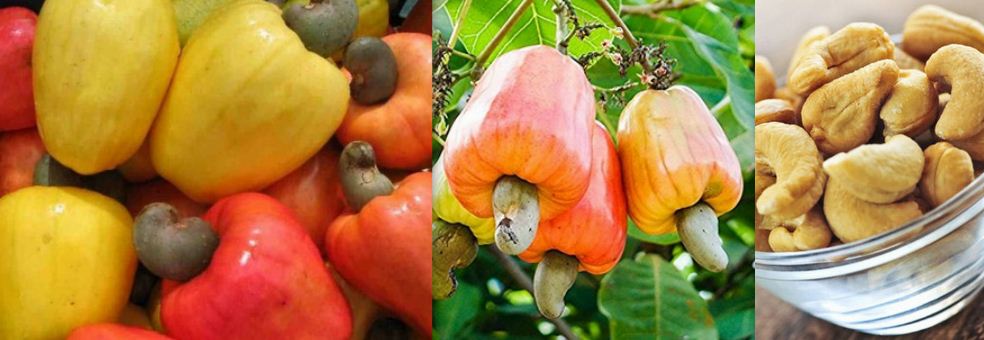About Health Benefits of Cashew Fruit

The cashew fruit is the colorful red or yellow juicy bit hanging off a cashew tree. You will find it very tangy-sweet. Eating it won’t just be a meal; it has life-enriching nutrients that can lift your mood daily. Everyone knows the cashew nut, but the cashew fruit is a lesser-known treasure waiting to be tasted.
I’ve done solid research to gather five essential health benefits of the cashew fruit that can help you no matter where you live. Plus, I’ll show you easy ways to enjoy it. Let’s see why cashew fruit is a good addition to the kitchen.
Why Cashew Fruit Is Special
In the warm areas of Brazil, India, and Nigeria, cashew fruit is also called cashew apple. It's the part that grows with the famous cashew nut and is rich in vitamins, minerals, and antioxidants. One medium cashew fruit (around 50 grams) is low in calories but delicious and healthy in taste. Want better immunity and a happier stomach? Cashew fruit nutrition has just what you need. Look at these five benefits and see how they can help you.
Cashew Fruit Keeps the Doctor Away – Who Knew?!
1. Boosts Your Immunity
You don’t want to catch a cold; cashew fruit will help you avoid it. The fruit provides plenty of vitamin C, unavailable in oranges, and gives you more than 100% of the daily requirement.
Vitamin C is immune-boosting and helps the body fight germs that want to slow it down. According to the National Institutes of Health, vitamin C is essential to building immunity.
You get quite a bit of vitamin C from cashew fruit. When you eat cashew fruit regularly, your body builds a shield that protects you from being sick, so you can go to school or work and have fun!
How It Works
Eating cashew fruit often builds up your body’s shield, so you can keep up with school, work, or just having fun without getting sick.
How to Enjoy Cashew Fruit for Immunity
Peel it and eat it fresh for a quick boost.
Combine it into a smoothie with berries and water for a cashew fruit recipe.
2. Keeps Your Heart Strong
Your heart is always pumping, and cashew fruit helps it. The cashew fruit is packed with potassium, which helps to steady blood pressure levels. The fiber inside a cashew fruit lowers lousy cholesterol that can block arteries.
A Victor Cardiology Article 2022: There is scientific evidence that Potassium and Fiber are beneficial in reducing heart attack and stroke risk. You can easily care for your heart and stay active by including cashew fruit's health benefits in your diet.
How It Works
Potassium helps to contract blood vessels, while fiber clears cholesterol, making your heart's work easier.
How to Enjoy Cashew Fruit for Heart Health.
Start your day with heart-healthy oatmeal and nuts. Mash it with lime for a topping on grilled fish.
3. Helps Digestion and Keeps It Smooth
If your tummy doesn’t hurt, your day will likely be okay. Cashew fruit can do that. The 1 gram of fiber in the cashew helps move food through your organism, so you do not become bloated. Furthermore, cashew fruit has a juicy taste and 90% water content.
A 2017 study in Nutrients says fiber and water are essential for optimal digestion, and cashew fruit nutrition offers both. If you eat cashews regularly, your stomach will be calm, resulting in no issues with your food.
How It Works
Fiber helps move food, while water keeps it soft, making digestion easy.
How to Eat Cashew Fruit for Digestion
Eat it after a big meal to settle your stomach. Toss chunks into yogurt for a digestion-friendly snack.
4. Gives Your Skin a Glow
Similarly, people want their skin and complexion to look smooth and healthy. Cashew fruit contains a lot of vitamin C (over 100% of the daily requirement), helping your body make collagen that keeps skin firm and soft.
A 2022 Journal of Cosmetic Dermatology report says vitamin C safeguards the skin from sun damage and helps the skin look fresh. The water in cashew fruit keeps dryness away, too. Incorporating cashew fruit recipes into your meals is a delicious way to pamper your skin.
How It Works
Collagen from vitamin C is used for firm skin, and water is used for hydration. That's such a killer combo for a glow!
How to Use Cashew Fruit For Skin
Eat it fresh with breakfast for skin nourishment. Process it into a 10-minute face mask, then cleanse
5. Fighting Inflammation
If you feel sore or puffy after a long day, sample cashew fruit. It contains vitamin C and flavonoids that reduce inflammation and relieve aches and swelling.
As potent antioxidants, these nutrients can help naturally support your body, according to a 2017 Nutrients study. Since you are an athlete who plays sports or a calm person at home, consuming cashew fruit regularly will help you keep your body healthy.
How It Works
These antioxidants prevent soreness and help to relax your body.
How to Enjoy Cashew Fruit for Inflammation
Add slices to a salad with greens for a calming bite, or make a ginger and ice smoothie for a refreshing drink.
What’s Inside the Cashew Fruit?
A medium cashew fruit weighing about 50 grams offers various health benefits.
This drink will give you just 35 calories.
Water: 90%—keeps you hydrated.
Fiber: 1 gram—helps your tummy.
High in vitamin C, it helps boost your immunity and is terrific for your skin.
Potassium: 6% of daily need - Heart health assistance
Antioxidants: Flavonoids and more—fight inflammation.
The USDA and what I found myself verified those numbers.
How to Add Cashew Fruit to Your Diet Every Day
It is hard to find fresh cashew fruit outside of tropical places, but you can find it frozen, juiced, or dried in most areas. The following cashew fruit recipes can be added to your Day anywhere.
Breakfast Ideas
Peel it and eat it fresh, quick, and easy. Blend it with milk and berries for a bright smoothie. Chopped into oatmeal with honey, it makes a great topping.
Lunch Options
Mix it with salad chunks and a light dressing for a good start. Add some tomatoes as a side to your chicken. Add slices to your turkey sandwich to make it juicier.
Dinner Suggestions
Add chunks to a veggie stew for sweetness. Grilled Fish Favorite: Add mashed cashew with lime for flavor. Put it into rice and add some salt.
Snack Solutions
You can eat it plain when you’re hungry. For a sweeter bite, try it with an apple or mango. Blend it with ice for a refreshing cashew fruit recipe sip.
Why Cashew Fruit Is Worth It
Cashew fruit is juicy, tasty, and healthy, but not a fairy tale. It is often rare to find fresh, but it is worth looking for it as juice or dried. The five potential health benefits of cashew fruit, namely a better immune system, a healthier heart, smooth digestion, glowing skin, and reduced inflammation, are authentic and backed by science.
With these tips on how to eat cashew fruit, you can start small, maybe a bite a day, so that you can feel the difference. Your body will love it. Give these cashew fruit recipes a shot and tell me how it goes. It’s a fun way to be healthy!




